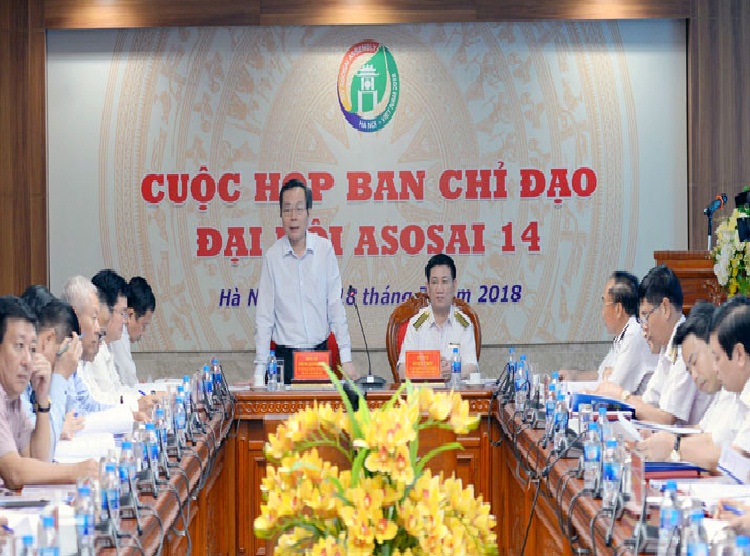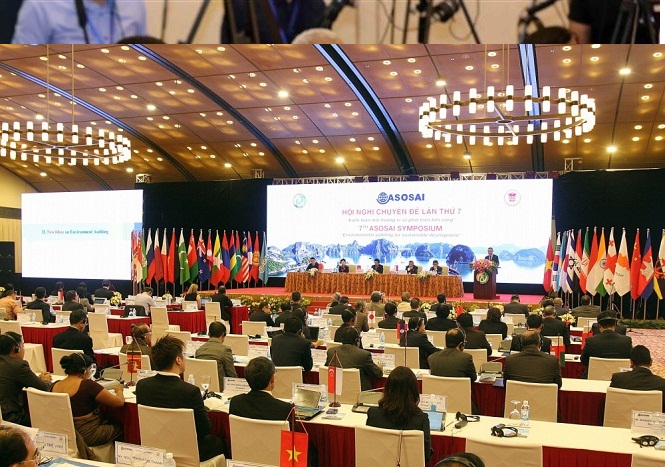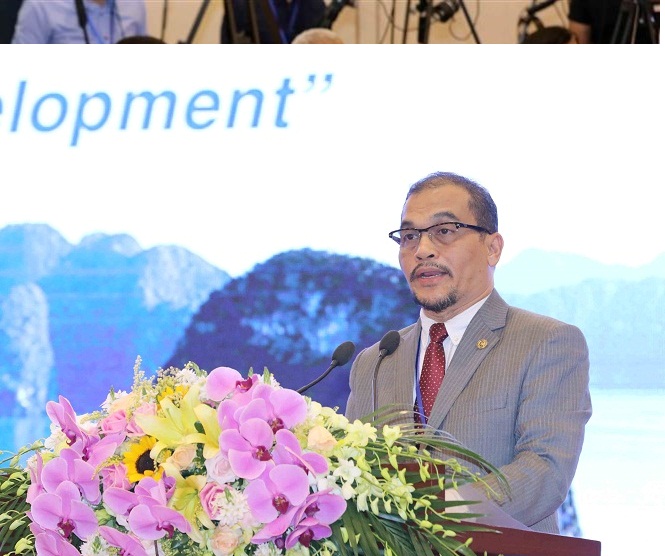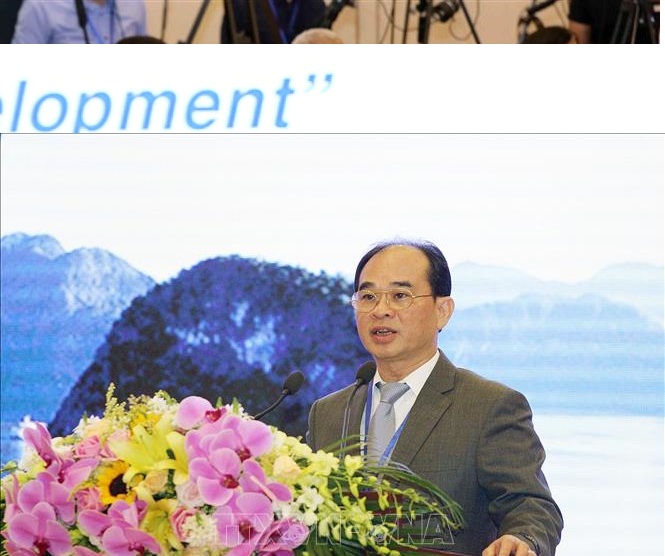Under the 14th ASOSAI Assembly agenda, the 7th Symposium on "Environmental Auditing for Sustainable Development" took place in Hanoi on 20 September 2018. This is an important agenda item demonstrating the commitment and effort of ASOSAI community in pursuing the UN Sustainable Development Goals and addressing environmental challenges in the region.

Vietnamese Auditor General Mr. Ho Duc Phoc at the Symposium
Speaking at the event Dr. Ho Duc Phoc, Auditor General of Vietnam stressed that environment protection is currently among the top concerns in each of every country in the world. Phoc reminded that global ecological degradation is currently causing drastic climate changes and catastrophic disasters in all part of the world, particularly in developing countries. Environmental challenges are forecasted to be even more serious and could hamper national development of all nations. Environmental auditing in support for sustainable development is hence seen as an essential but tough part in audit tasks of all SAI in the community.
Speaking about environmental auditing in Vietnam, Phoc informed that SAI Vietnam has recently used more of its resources on audits of environment-related issues. During 2010 and 2018, SAV undertook five environmental audits each year on such topics as management of forest, land and clean water, and on administration of wastes, mining and most recently low carbon transition in energy efficiency. He then urged the participants to see this symposium as a good platform to showcase their commitments and actions to protecting both regional and national environment. He also called for better promoting experience exchanges among SAIs, and between regional SAIs and international partner organisations, particularly by advanced SAIs so that environmental audits could be more efficiently conducted in the region.
 A photo on the overview of the 7th ASOSAI Symposium in Hanoi
A photo on the overview of the 7th ASOSAI Symposium in Hanoi
The Auditor General of Vietnam then expressed his hope that the topic would be a potential area for bilateral and regional cooperation activities in the years to come.
Referring to the role of SAIs to sustainable development, Secretary-General of the Audit Commission of the Republic of Indonesia Mr. Bahtiar Arif said "As one of the countries having committed to achieving sustainable development goals, Indonesia issued the Presidential Decree No.59 in 2017 on national implementation of SDGs, and to maintaining and securing necessary resources and capacities thereto”.
To fulfill this role, SAI Indonesia is relying on a seven step audit framework which includes a cooperative program with SAI Netherlands, European Court of Auditors and several other partner SAIs, begins with a review of planning for national SDGs and on. In addition, SAI Indonesia has developed 12 criteria (of which four on policy, four on performance and four on monitoring and reporting) to assess the Government's efforts in policy making and exercise of national SDGs in Indonesia.
It is while Mr. Khalid Khan Bin Abdullah Khan, Deputy Auditor General of Malaysia said the National Audit Department of Malaysia (NADM) has its legal rights to conducting performance audits as prescribed by the Audit Act 1957. Under the law, performance auditing shall include audits of environmental issues with a view to ensuring the accountability, effectiveness and efficiency of programs and activities by ministries and government agencies against legal regulations on environment.
He informed that in 2008 NADM set up an Environmental Auditing Division upon common realising of increasing importance of this audit topic. Since then SAI Malaysia has conducted over 50 audits of environmental issues at both federal and state levels. All of these audits were carried out in compliance with ISSAIs on Environmental Auditing, INTOSAI’s Environmental Auditing Guidelines, and Guidance of the INTOSAI Working Group on Environmental Auditing (WGEA) and audit guidance of the NADM.
 Mr. Khalid Khan Bin Abdullah Khan, Deputy Auditor General of Malaysia is sharing his lessons on environmental auditing at the symposium
Mr. Khalid Khan Bin Abdullah Khan, Deputy Auditor General of Malaysia is sharing his lessons on environmental auditing at the symposium
During his key note, Mr. Li Feng, Director General of Natural Resources and Environmental Auditing Department of the National Audit Office of China held that to conduct environmental audits effectively a BIG DATA database must be put in use by auditors. Mr. Li informed the audience that China is aiming to digitalising data relating environment and using a digital platform for its environmental perspective audits. On that background, Li Feng said the CNAO could be able to better monitor and collect feedback from local residents on the effectiveness of ecological audits, and that it could improve the efficiency of environmental auditing activities of the CNAO. In his report, he also required for a balance between economic development and environmental protection, and then the need for conducting environmental auditing in line with the nature of environment in different terrains such as border areas, coastal areas, etc.
Representing the host SAI Vietnam, Mr. Nguyen Quang Thanh, Deputy Auditor General informed the participants in his national report that the SAV will rely on assessments of SDGs performance by the national government and sub-national governments to prepare a strategic audit plan and annual audit plans, particularly for environment audits in short and medium terms.
 Deputy Auditor General Mr. Nguyen Quang Thanh is presenting Vietnam national report on environmental auditing
Deputy Auditor General Mr. Nguyen Quang Thanh is presenting Vietnam national report on environmental auditing
According to Thanh, under the plans SAV tends to focus on auditing of waste water, air and climate change. In parallel, it will also enhance performance auditing in other areas to enable it to broadly assess the management and use of public resources and accountability for environment protection by the State management agencies to support SDGs implementation.
Also at the symposium, many other representatives from ASOSAI member SAIs presented in-depth presentations and participated in active discussions on common interests like new ideas, concepts, procedures and measures to promote environmental auditing in support for sustainable development in the region.